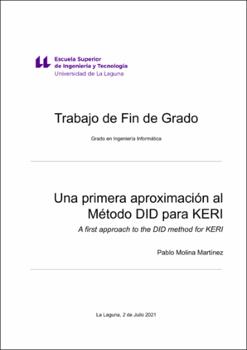Una primera aproximación al Método DID para KERI
Author
Molina Martínez, PabloDate
2021Abstract
En este trabajo de fin de grado se plantea el estudio, análisis y desarrollo de una
tecnología emergente, la tecnología de la auto identidad soberana SSI (Self Sovereign
Identity). Con el uso de esta tecnología se busca que un usuario tenga control total de sus
datos y no necesite depender de terceros para poder realizar operaciones tan básicas
como demostrar que uno mismo es quien dice ser. En un principio esto es una tarea muy
complicada de conseguir, sobre todo en internet en donde, la suplantación de identidad, el
ip spoofing y miles de métodos maliciosos más están a la orden del día.
Este trabajo poco a poco va a ir adentrándose en el mundo de las auto identidades
soberanas, empezando por los fundamentos básicos de este nuevo grupo de tecnologías.
Los identificadores descentralizados (DID) llevan ya un tiempo en uso y permiten la
autenticación de un individuo sobre una fuente de conocimiento común, muchas veces
conocida como blockchain. En este trabajo se va a ampliar el uso de los DID. Se pasará
de necesitar una raíz de confianza común, a que cada individuo tenga su propia raíz de
confianza. Se verá que no es necesaria la raíz de confianza común para conseguir la
autenticación de un individuo. Gracias a no depender de dicha raíz de confianza común,
el individuo genera y maneja claves públicas de forma segura. Dicha seguridad se basa
en mecanismos de seguridad post cuánticos y sistemas de registro para poder llevar a
cabo un control de las acciones que se realizan. Todos estas características se ven
cumplidas con KERI, una infraestructura para el manejo de claves. A su vez, KERI es una
tecnología que se encuentra en constante cambio y evolución, de reciente aparición que
está buscando ser el estándar en el mundo de las SSI.
Para finalizar tengo que recordar la última frase del párrafo anterior y es que KERI es
una tecnología de reciente aparición, la cual todavía no tiene un estándar de uso definido
y en la cual todavía quedan muchas barreras, siendo sin duda la usabilidad una de las
más difíciles. Como se verá en este trabajo, KERI es una tecnología que en su
planteamiento parece que no tiene fallos, pero el verdadero problema llega a la hora de su
implementación, es por eso que este trabajo busca arrojar un poco de luz a un abismo
que tarde o temprano se va a tener que iluminar. This end of degree project implies a study, analisis and development of an emergent
technology, the Self Sovereign Identity (SSI) technology. The use of this technology aims
for a user to have full control of their data, not depending on third parties for doing basic
operations like acknowledging their own identity. This task is very hard to archive at first
sight, moreover in the internet where the souplantation of identity, the ip spoofing and
thousand oh malicious methods are everywhere.
This project is going to take on the world of the self sovereign identities slowly, starting
from the basics of this new group of technologies.The Decentralized Identifiers (DID) have
been present for a short period of time, allowing an individual to authenticate itself by using
a common root of trust most of the time know as Blockchain. This project is expanding the
use of the DID. Starting from needing a common root of trust as previously mentioned, to
the individual being their own root of trust. Being the ultimate goal to demonstrate that a
user can authenticate itself without needing to depend on others. What this implies is that
the individual has full control over his keys, being the one who generates and performs the
actions that are made with them. The security needed to archive this can be done with
post cuantum mechanism and keeping control over the operation done with the identifier.
All of these specifications can be meeted with KERI, an infrastructure that's designed for
key management. KERI is an infrastructure that's in constant change and evolving, being a
new technology in the world of the SSI, trying to be the standard.
To end this abstract i would like to remember the last phrase from the previous
paragraph, KERI is a new technology, what that means is that there isn't a defined
standard on how it should be implemented. It has many problems when implementing it,
being the usability his biggest flaw right now. As it will be seen in this project, KERI is a
technology that in its theoretical bases seems flawless, the implementation being its
biggest problem, that's why this project tries to bring light over the abysm that is going to
need to be lighted soon.





